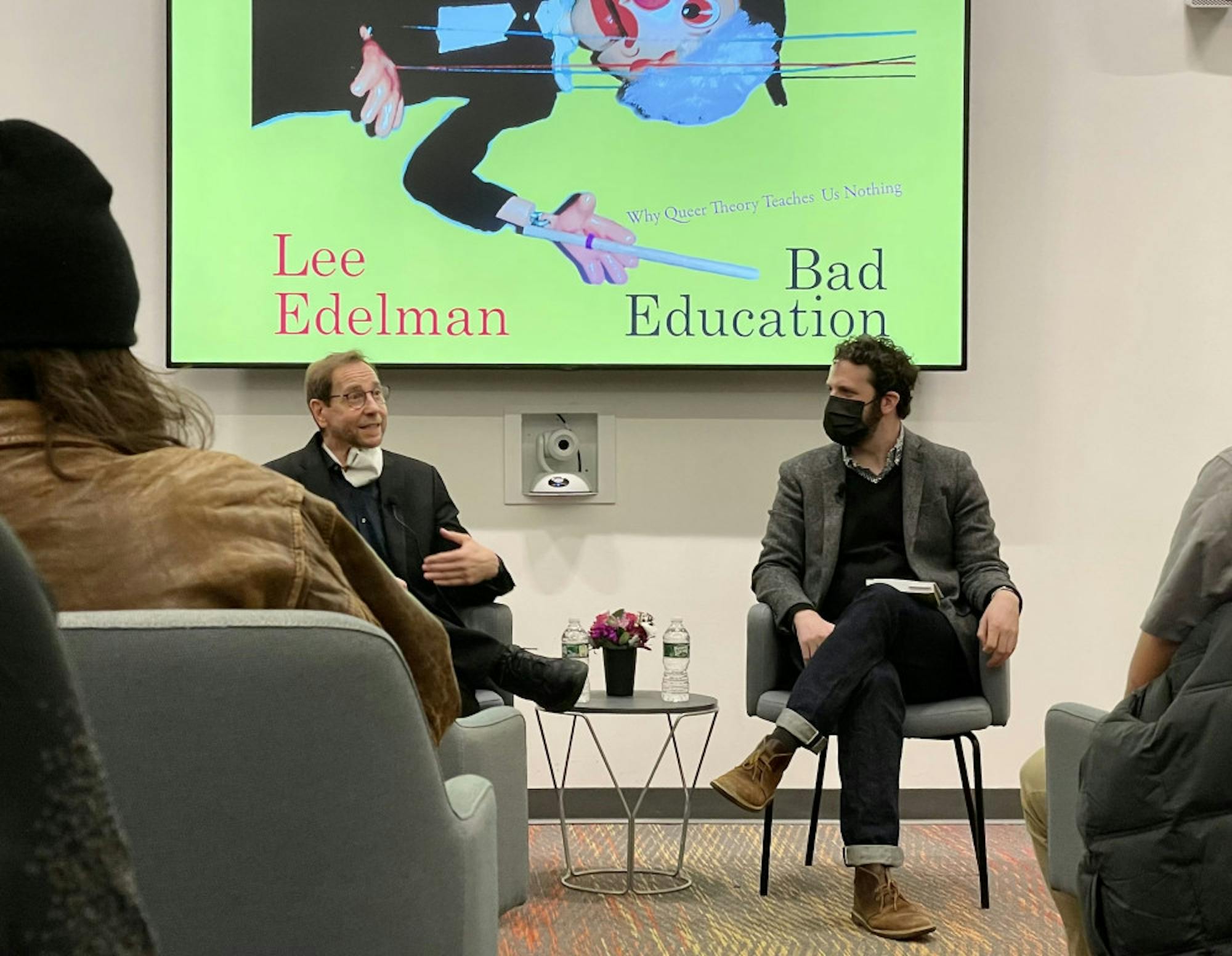Lee Edelman discussed his new book “Bad Education: Why Queer Theory Teaches Us Nothing,” with fellow Tufts English professor Jess Keiser on March 9 at an English department event. Edelman, the Fletcher professor of English literature at Tufts, and Keiser unpacked the book’s key theses and its relevance in today’s context.
“This book … was started many years ago, long before the contemporary culture wars around education,” Edelman said. “Whole areas of academic expertise and conceptualization are being tabooed by government intervention. … The fate of the humanities is being decided, but not only the humanities; because … the humanities really are in this case, the canary in the mine. The humanities will be the first to go but what’s really under attack is education itself.”
Edelman refers to ‘bad education’ in two ways: one in a rebellious, counternormative sense, as “an education that is focused on the possibility of interrogating rather than producing step-by-step blueprints about how to produce something that will make more money,” and another as one which is designed to transmute basic values and knowledge to students.
“The [premise] of the book is that all of the institutions of education are organized to generate a positive product,” Edelman said. “That product can simply be identified as meaning, values, understanding, knowledge [or] something that is transportable and measurable.”
Edelman argues that certain identities, such as queerness, Blackness and womanhood, are relegated to a space without meaning in society — he says that society tries to materialize these groups with language so that it may marginalize and exclude them.
An education of poor quality, Edelman says, is one that tries — and fails — to prescribe meaning to terms like ‘queerness’ which represent, as Edelman suggests, an “attempt to materialize what is in itself conceptualized as outside of or other than being.”
“You can’t exclude non-being simply by calling it ‘non-being,’” Edelman argued. “You find a figural substitution for non-being … then that figure of non-being can be cast out of the social order, as if thereby you were purging the social order of the non-being that is inherent to that social order itself. This is the logic that ‘Bad Education’ follows.”
Following his introduction, Keiser asked Edelman about psychoanalysis and its reputation among students and professors.
“Freud, psychoanalysis, queer theory, critical race theory; all of them are … [cast aside] because they are interpretive sciences,” Edelman responded. “The neoliberal university … wants to turn [students] into ChatGPT: regurgitating what is known, making the same material available over and over again, but prohibiting or restricting the possibility of placing any value in the analysis or interpretation of events. … Psychoanalysis is the art of interpreting what refuses interpretation.”
Keiser then asked Edelman about his book’s critique of both liberal and conservative identity politics.
“The right knows that society is divided, and it plays on divisions within society,” Edelman said. “The discourse of the left is the discourse of inclusion, and it’s the discourse of overcoming division, … [but] it doesn’t overcome division. Its very goal of inclusion necessarily excludes those who are in favor of exclusion.”
Edelman argued that, to imagine a liberal utopia in which everyone agrees is to imagine a world without dissent, or as he put it, “a fatal necropolis where thinking has ceased.”
Keiser asked Edelman how he would respond to a reading of “Bad Education” which equivocates identities Edelman sees as marginalized.
“Every designation of an excluded, delegitimized population will have its unique history, and it will have its unique social circumstances that will affect how the experience of those persons unfolds,” Edelman said. “But that’s different from saying that those populations don’t share the experience of a form of exclusion.”
A key paradox “Bad Education” explores is the impossibility of trying to describe something that does not exist. Keiser asked whether examples of “nothing” can be translated into a literal figure for purposes of critical discussion. Edelman suggested art as a medium for confronting “the space of the nothing.”
“We’re accustomed to thinking that art requires us to unpack something. … We think that life is literal, and it never is,” he said. “There is no literal world; there are only worlds created through language, just as there are only queers or Blacks created through language. [As] James Baldwin said, color is not a human or a personal reality, it’s a political reality.”






